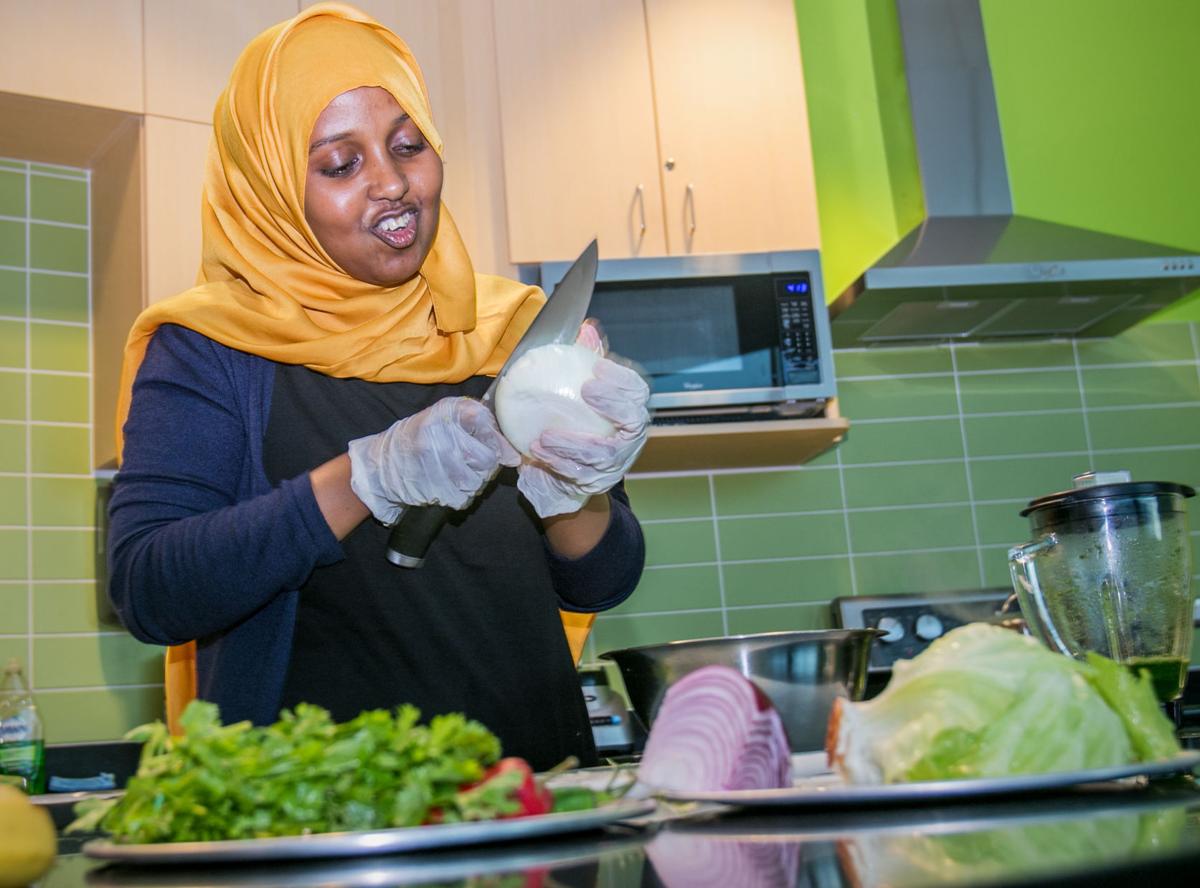“Today, I’m going to give you the food of Somalia,” Chef Samiro Elmi says to her practice cooking class. “Are you ready to eat?”
Elmi is preparing for the 3-hour class she’ll be teaching in partnership with the International Rescue Committee and the Tucson Jewish Community Center.
Elmi is a Somali refugee who moved to Tucson last March.
“America is a peaceful country; that’s the experience I’ve gotten,” Elmi says with the help of translator Fardoso Mohamed.
Elmi is originally from Somalia, but spent eight years in Kenya before moving to Tucson to receive a better education for herself and her three children.
“Tucson is a nice place,” Elmi says. “It’s a bit hot, but I like it. I don’t miss much about Somalia, even the food, because I can make it all myself.”
Elmi, who works full-time preparing tamales for Tucson Tamale Company, learned to cook from her mother when she was very young. This will be her first time teaching a cooking class.
Her enjoyment for cooking is quite simple. “I like to cook because everyone likes food,” she says. She doesn’t plan to open her own Somali restaurant in Tucson; she says her children love her cooking, which is more than enough for her.
Elmi says the upcoming cooking class is important to her and to Tucson because she wants to teach Tucsonans about the cuisine and culture of Somalia.
“There are a lot of different foods in Somalia, but I can’t show it all in one day,” she says. “But the foods I will show are important to me.”
One of Elmi’s favorite meals is bariis, a Somali rice dish. The dish usually consists of Basmati rice, veggies, and spices such as cilantro, garlic, and cumin. Elmi serves the dish with raisins and a homemade chile pepper sauce with a freshly cut salad on the side. Bariis is often served with a banana, which isn’t meant to be eaten separately.
The beauty of bariis is how different it can be prepared, says Elmi. She often uses different vegetables and spices, and sometimes adds different meats.
Although spices are important in Somali cuisine, Elmi says that vegetables are the key. Even in a simple dish like scrambled eggs, Elmi likes to add in tomatoes and onions.
Another one of Elmi’s favorites is baasto, which is pasta served with a thick tomato sauce, vegetables, sometimes a banana, and “a lot of meat,” as Elmi says. She also likes to serve bariis with baasto.
As for an American favorite of Elmi’s, she says she loves good ol’ Kentucky Fried Chicken and wouldn’t mind learning how to make the chicken herself.
“I’m a good learner,” she says. “If you show me once, I’ll get it.
The JCC has previously worked with the IRC to present two Syrian cooking classes, both of which sold out. This is the first Somali cooking class offered.
“This collaboration pays homage to the history of the JCC’s legacy as a support site for immigrants,” says Barbara Fenig, the JCC’s director of arts and culture.
According to Fenig, Tucson is home to 900 refugees from around the world.
“Food brings people together,” Fenig says. “What better way to celebrate a community partnership than to gather around the table to share a cooking lesson, a meal, and conversation between people from all backgrounds, faiths, and ages?”
Besides the Somali class, the JCC will work with the IRC to offer four more Syrian cooking classes in the fall, in addition to Congolese and Iraqi classes in the spring. Each class will be led by a refugee.
- Gloria Knott
Details:
What: Somali Cuisine Cooking Class with Chef Samiro Elmi.
When: 12—3 p.m., Sunday, Aug. 6.
Where: Tucson Jewish Community Center, 3800 E. River Road
Cost: $65 for members, $75 for non-members.
More information: tucsonjcc.org.
Et cetera: The JCC’s upcoming Syrian cooking classes will take place Sundays, September 17 — October 8.





